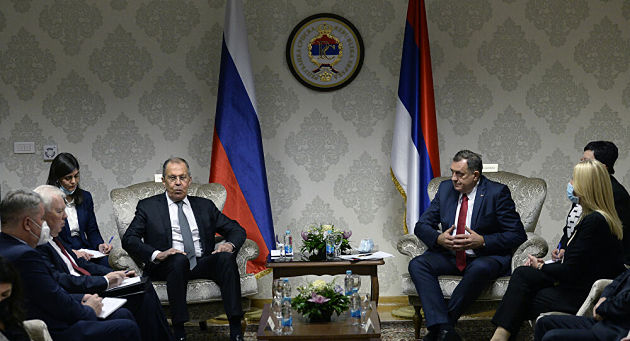The fact that Sergei Lavrov’s visits to Bosnia and Herzegovina (BiH) always provoke protests from its Muslim community (https://golosislama.com/news.php?id=35092) has become the norm. This time, however, the Russian foreign minister’s actions resulted in two of the three co-presidents of BiH – Shafik Jafarovic from the Bosniak (Slavic-Muslim) community and Željko Komšić from the Croat community – refusing to meet with him.
Lavrov achieved this through the format and content of the meeting he held with the third Co-President of BiH, Milorad Dodik, from the Serb people. During the meeting, the experienced diplomat Lavrov did not pay attention to his interlocutor, who is an official of BiH, that he should conduct the meeting under the flag of BiH, not the Serbian Republic of BiH, whose office he has not held since 2018. This was pointed out in a protest statement by the other two BiH Co-Presidents. But this symbolic mistake was clearly not accidental.
On the contrary, from a symbolic point of view, Lavrov’s visit was carefully planned – it took place exactly on the anniversary of the signing of the Dayton Accords, which ended the war in BiH on December 14, 1995. At the meeting between Dodik and Lavrov, they spoke “against the revision of the Dayton Accords” and in support of the decision of the Parliament of the Serb Republic of BiH on its non-aligned status. This showed a distorted understanding of these documents, as the other two co-presidents of BiH had indicated.
After all, the Dayton Accords provided not only for the end of the war, but also for mechanisms for the reintegration of BiH and the restoration of rights violated during the war, including the right of refugees to return. All of this was incorporated into the supplementary agreements, which together formed the Dayton package. However, the authorities of the Serb Republic of BiH, including Milorad Dodik when he was its leader, did everything to prevent the implementation of these provisions. He openly stated that he considered the restoration of BiH a mistake and that BiH itself was a “national misunderstanding”, without hiding his plans to separate from it and reunite with Serbia, in other words, to return to the policies that triggered the war in the 1990s (https://golosislama.com/news.php?id=37120).
And together with this person, Sergey Lavrov decided to defend the Dayton agreements? The same applies to the decision of the Parliament of the Republic of Serbia on the non-aligned status of the country. It was declared illegal by the Constitutional Court of Bosnia and Herzegovina on the grounds that the laws of that country already included provisions for NATO membership as a strategic goal of the country. In other words, Lavrov is openly supporting decisions that have been declared unconstitutional in the country he is visiting. What is this if not blatant impertinence?
The meeting that Lavrov held with Croatian nationalist politician Dragan Čović after his meeting with Milorad Dodik is in the same vein. Yes, Dodik is also a Serb nationalist, but at least he is a legitimately elected co-president of BiH representing the Serb people, and Lavrov could meet with him as a Serb leader of BiH. However, Željko Komšić is the legitimately elected co-president of BiH representing the Croatian people – a supporter of the unity and sovereignty of the country – whom Croatian nationalists refuse to see as their leader. Therefore, by distinguishing him from other politicians, Sergey Lavrov clearly indicates that he considers Dragan Čović to be a Croatian leader. In other words, someone who, like Dodik, advocates the partition of Bosnia and Herzegovina and the creation of a Croat entity within it, whereas the Dayton Accords stipulate that it consists only of the Serb Republic and the United Bosniak-Croat Federation of Bosnia and Herzegovina.
All this confirms what we have repeatedly written – the Kremlin is pursuing a policy of incitement against BiH, leaving its Muslim and patriotic leaders no choice but to openly oppose it (https://golosislama.com/news.php?id=38891). However, there is another circumstance that is exacerbating this conflict – the election of Joe Biden as President of the United States. While leaders of many countries, including Muslim ones, have reasons to be wary of him and his new American policies, Bosnian patriots, on the contrary, have high hopes for them. After all, during the Bosnian war, Joe Biden, who served as the US Secretary of State at the time, was a staunch opponent of Serbian chauvinism and a close friend of the leader of the Bosnian Muslims, Alija Izetbegović.
Therefore, their current leader, his son Bakir Izetbegović, who claims that Biden transferred his sympathy for his father to him, now has reasons to hope for unequivocal support from the United States. In such a situation, the confrontational actions of the parties pose a threat that the talks on the protection of the Dayton Accords may actually come to an end. As a result, either BiH will be completely dismembered into three parts if Moscow wins, or with the support of Washington, Croatian and Serbian separatism will be defeated, including the liquidation of the Serbian Republic.
* In the photo, Sergei Lavrov meets Milorad Dodik under Russian and Serbian flags.

